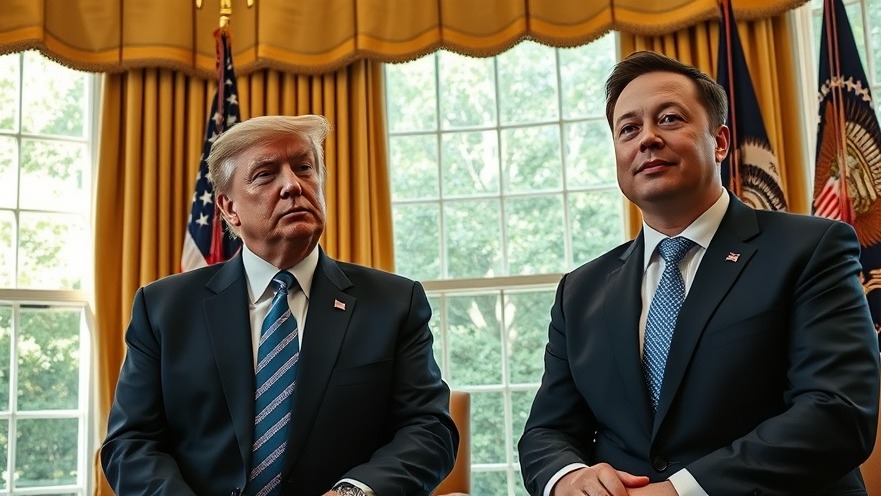
Elon Musk's Shift in Political Allegiance: What It Means for 2026
As the 2026 midterm elections approach, the political landscape is heating up with unexpected alliances and fiery rhetoric. One of the most intriguing developments has been the evolving relationship between tech billionaire Elon Musk and American politics, particularly in relation to the Republican Party. Musk has recently engaged in a very public spat with former President Donald Trump, raising speculation about how his influence may shift in the upcoming electoral cycle.
The Intrigue of Political Rivals
Rep. Ro Khanna, a prominent Democrat, has openly invited Musk to turn his critical eye towards MAGA Republicans. Khanna's expectation that Musk could direct his efforts against Trump has excited many within the Democratic Party, who see this as an opportunity to leverage Musk's vast platform and following to sway public opinion. As one of the richest individuals globally and the face of several major tech companies, Musk's political engagements matter significantly, transforming the narrative of the elections ahead.
Public Perception and Media Amplification
The media has been buzzing with excitement over the Musk-Trump feud, using it as a lens to discuss deeper ideological divides within American politics. This rivalry has sparked a mix of reactions among the American populace, reflecting broader partisan sentiments. Will Musk's criticism of Trump galvanize younger voters who are disillusioned with traditional politics? Only time will tell, but the question remains crucial as both parties prepare their strategies.
Potential Outcomes for the Democrats
If Musk truly becomes a vocal critic of MAGA Republicans, it could serve several important functions for the Democratic party: energizing their base, attracting undecided voters, and differentiating Democrats from their Republican counterparts. Such an evolution might resonate particularly with younger, tech-savvy voters who idolize Musk's accomplishments, potentially amplifying the Democrats' message.
Counterarguments: Skepticism Around Musk's Political Influence
However, it's essential to approach this situation with caution. There are significant counterarguments about whether Musk’s involvement could backfire. Critics argue that his decision to wade into political commentary often comes with unpredictability, sparking more controversies than constructive dialogue. Moreover, skepticism remains about whether a billionaire, regardless of his political leanings, can genuinely connect with mainstream Americans struggling with economic inequality and trauma from political divisions.
The Stakes of Personal Influence in Politics
Musk's trajectory demonstrates the increasing relevance of personal influence over traditional political structures. His reach through social media platforms makes him a powerful voice at a critical time. This trend aligns with the broader societal expectations that public figures should take stances on social and political issues. As we head into the election season, voters are keenly aware of how these connections may shape policy and the political landscape.
Closing Thoughts: Action in Political Engagement
The discussions surrounding Musk provide a notable lens through which to view the relationship of influential individuals in politics. With the political divide growing deeper, understanding the implications of such high-profile endorsements or criticisms has never been more crucial. For those watching the upcoming elections, it's essential to engage critically with the narrative shaping national news and the potential impacts of celebrity involvement in politics.
The time is ripe for voters, especially younger demographics, to grasp how influential voices can sway public opinion and policy. As we engage in discussions around such figures, it’s vital to consider what their platforms really advocate and how these discussions affect the core of American democracy.
 Add Element
Add Element  Add Row
Add Row 



 Add Row
Add Row  Add
Add 


Write A Comment